
This glass-fronted secretary is full of old books—cookbooks and books on household management and helpful hints. When I open the doors, the smell of old books—so different from the smell of a library—always makes me smile.
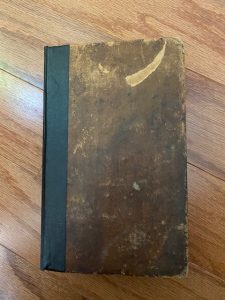
Instructions For Cookery, In Its Various Branches, By Miss Leslie is dated 1843. This is the 17th edition (!) “with improvements and supplementary receipts.” As far as I know, it is my oldest book. I say, “As far as I know” because not all old books are dated. For example, this 64-page relic was printed in Edinburgh, sometime before 1890.

Books of this sort are my first collection, and still the most numerous. In the beginning I bought books like High-Class Cookery Made Easy by Mrs. Hart for what was on the printed page: how things used to be done. I found the recipes fascinating: instructions to “assemble the [cake] ingredients in the usual way”; lists of ingredients with no measurements. (Fanny Farmer [see below]first introduced standard measurements in 1896.)
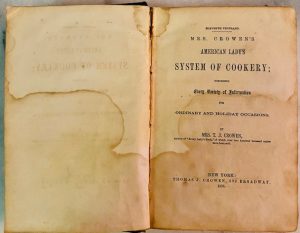
When I open a book of great (by my amateur standards) age, I like to ponder what sorts of women might have owned and used it over the decades. This copy of Mrs. Crowen’s American Ladies’ System of Cookery cookbook is inscribed Mrs. Dr. S. S. Fitch, May 18th, 1860. It reminds me of the German practice of addressing someone as Herr Doctor Professor So-and-so. Might she be of German background?
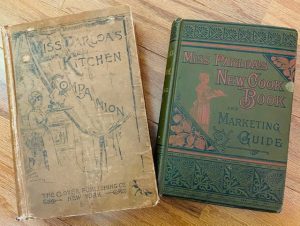
The books printed in the 1880s and more recently are much more likely to be in good condition. Then, as now, once one made a name for oneself, more book deals followed. Miss Parloa’s Kitchen Companion and Miss Parloa’s New Cookbook and Marketing Guide are early examples of this.
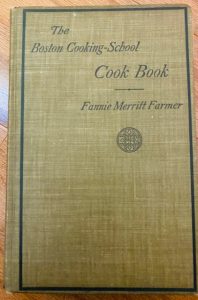
Perhaps the best example is Fanny Merritt Farmer. She paid Little, Brown, and Company to publish her Boston Cooking School Cookbook in 1896. My earliest copy is from 1904. By then, it had been copyrighted 1896, 1900, 1901, 1902, and 1903. The flyleaf of my copy says it is revised with an appendix of three hundred recipes, and an addenda of sixty recipes. (Note the modern spelling of recipe.) She is listed as the author of Chaffing-Dish Possibilities and Food and Cookery for the Sick and Convalescent.
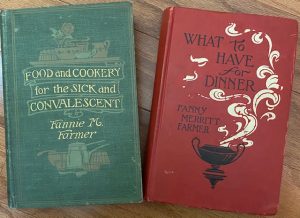
I have a copy of the latter, as well as What to Have for Dinner, copyrighted 1904, 1905, 1907, and 1905, respectively. The Fanny Farmer Cookbook is still popular today.

But It’s More Than Just Old Cookbooks For Me!

Over the years, I’ve replaced numerous paperbacks with older hard-copy editions of favorite books. I like the worn covers and brittle, yellowed pages.
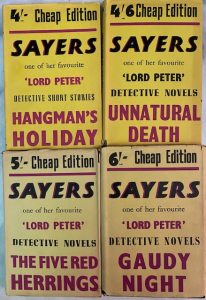
They remind me of reading books of fairy tales and the Ruth Fielding series from the early 20th Century at my grandmother’s house. It turns out that I’m not alone. Scent carries powerful psychological meaning for people—and triggers memories that otherwise are not readily available.
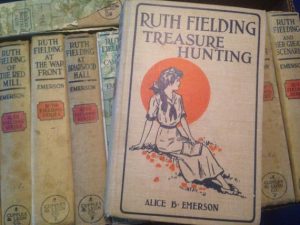
Many people, perhaps most, like the smell of old books. Science tells us that as books decompose over time, they emit a smell from decaying volatile organic compounds, very similar to chocolate and coffee! This is one time I really don’t need to know why I like something, just that I do.
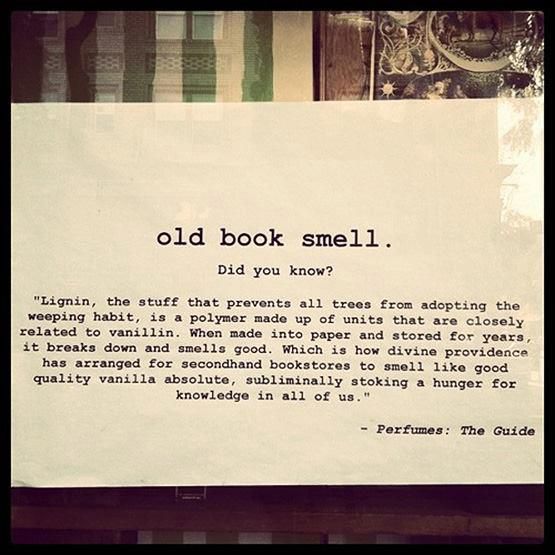
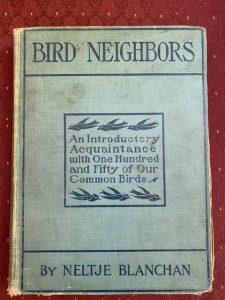
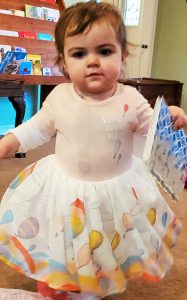
My most recently acquired old book, 1904, came along with my most recent obsession: Bird Neighbors!
Bottom line for writers: smell an old book and feel uplifted!
